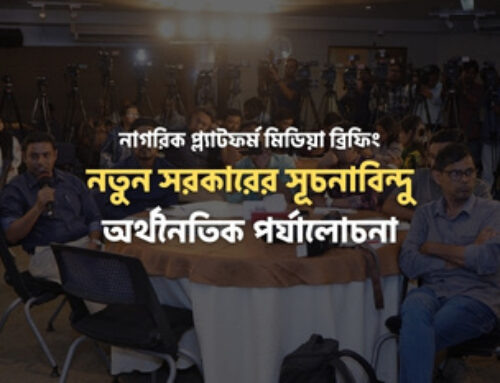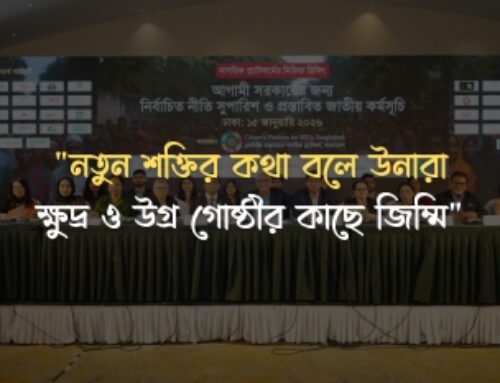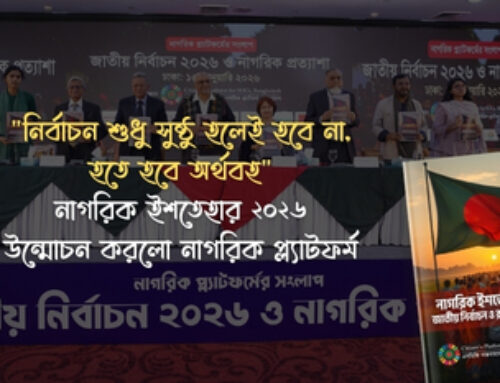
Bangladesh is preparing its FY2025–26 National Budget while engaging in global discussions ahead of the Fourth International Conference on Financing for Development (FfD4). With just five years remaining to achieve the 2030 Agenda and ongoing gender inequalities, it is essential to strengthen Gender Responsive Budgeting (GRB) to ensure fiscal policies address the needs and rights of women and girls.
Citizen’s Platform for SDGs, Bangladesh and UN Women Bangladesh jointly convened a pre-budget dialogue on “Advancing Gender-Responsive Budgeting and FfD4 Outcome” on 26 May 2025 in Dhaka.
Dr Debapriya Bhattacharya, Convenor, Citizen’s Platform and Distinguished Fellow, Centre for Policy Dialogue (CPD), highlighted the political and economic context for GRB, noting that women are disproportionately affected by economic challenges such as high inflation and reduced private investment, which are often underreported in official data.
Ms Gitanjali Singh, Representative, UN Women Bangladesh, stressed the ongoing importance of the Beijing Platform for Action and the need to institutionalise gender budgeting across ministries, focusing on priorities such as preventing child marriage, promoting inclusive infrastructure, and strengthening social protection, particularly as Bangladesh approaches LDC graduation.
Mr Towfiqul Islam Khan, Senior Research Fellow, CPD, presented on “The State of the Economy from a Gender Lens.” He highlighted a concerning decline of 1.8 million female jobs in the first six months of the current fiscal year (out of a total decline of 2.1 million jobs), alongside a halving of overseas employment for women in two years. He emphasised that the progress in gender empowerment is plateauing or decaying in critical areas. Mr Khan stressed the need for more detailed budget tracking beyond aggregate gender budget figures and argued that gender empowerment cannot be addressed through a “piecemeal approach,” requiring adequate attention in electoral debates. He also underscored women’s disproportionate burden of unpaid care work, high rates of young women classified as NEET (Not in Employment, Education, or Training), and the vulnerabilities of female migrant workers.
Ms Nubayra Jeheen, Programme Analyst-Gender Statistics, UN Women Bangladesh, presented on ‘Gender Responsive Budgeting in Bangladesh: An Overview’. She explained that gender-responsive budgeting ensures public spending meets the differing needs of all genders. She noted that although 44 ministries produce Gender Budget Reports, the data quality and alignment with the Sustainable Development Goals (SDGs) and climate budget coding need improvement to support transformative change.
Ms Rekha Saha, Secretary, Central Legal Aid, Bangladesh Mahila Parishad, presented ‘Charter of Demand and Financing for Gender Equality and Women’s Empowerment’. The charter of demands was developed in collaboration with Bonhishikha and with support from the UN Women Bangladesh. She highlighted demands centred on women’s participation, economic empowerment, decision-making representation, and evolving gender budgeting priorities that reflect the experiences of marginalised groups.

Distinguished Panellist, Ms Tasnim Zeben Bentea Sheikh, Deputy Secretary (Budget and Accounts), Ministry of Women and Children Affairs, emphasised the need for effective policy implementation through needs-based projects, targeted interventions informed by research and robust monitoring systems to ensure gender budget allocations address real needs.
Distinguished Panellist, Ms Ferdousi Sultana, Member of the Women’s Affairs Reform Commission, highlighted capacity gaps among implementing agencies and local governments, calling for sector-specific linkages, market analyses, and training aligned with current needs, while stressing a lifecycle approach to inclusive budgeting.
Guest of Honour Ms Maria Stridsman, Head of Development Cooperation at the Embassy of Sweden, observed that budgets inherently reflect societal values and stereotypes, necessitating diverse skills and strong communication to overcome resistance. She urged Bangladesh to fully embrace gender budgeting amid ongoing reforms.
Special Guest Mr Abul Kalam Azad, Joint Secretary of the Economic Relations Division, described gender-responsive budgeting as part of broader financial reforms, calling for increased focus on underfunded areas such as women’s economic participation and for greater use of digital tools and civil society engagement as Bangladesh transitions from development aid to economic cooperation.
The dialogue brought together government agencies, civil society and development partners to foster a shared understanding of GRB’s role in closing gender financing gaps and to inform the upcoming budget cycle and FfD4.





Leave A Comment